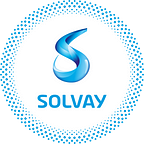From field to cryptography: How does blockchain help us with guar tracking ?
Sourcing sustainable resources while supporting local communities is good, but it’s only effective if you can consistently ensure the exact origin of those resources. Which is why Solvay decided to complement its Sustainable Guar Initiative supporting farmers in Northern India with its own in-house blockchain solution.
In 2015, Solvay and its partners launched the Sustainable Guar Initiative to support the livelihood of guar farmers and protect the fragile environment of the arid region of Bikaner, in the Northwestern Indian province of Rajasthan. Guar is a legume predominantly grown in India whose seeds are used as a gelling and thickening agent in many industries, especially in personal care products. Solvay transforms it and sells it to manufacturers such as L’Oréal and Henkel, the company’s main partners in this initiative.
Trust and transparency
The things is, the chain of guar production is long and complex, with many intermediaries, which makes it difficult to precisely trace each bag of seeds. So after the successful implementation of the Sustainable Guar Initiative, the next step was to create a system where the origin of the product could be fully guaranteed. “We were trying to find the best way to simplify our traceability issues, and we came up with the idea of using a blockchain,” says Matthias Förster, Global Key Account Manager at Solvay’s Global Business Unit Novecare.
Sure, it’s cool for a company such as Solvay to resort to a geeky, buzzword technology, but that wasn’t the real reason behind this choice. “We need to use a blockchain because we don’t own or control the entire chain; far from it,” continues Matthias. “This was the best way to increase trust and enjoy full transparency.”
A valid proof of concept
As you might know, blockchain provides a means of safely storing and recording transactions. Digital blocks are linked together cryptographically and asymmetrically, creating a chain containing data such as certificates of ownership or financial transaction proofs. The great advantage is that the chain cannot be tampered with, as it’s owned by and visible to all its users in real time.
So Solvay went ahead and “built a private blockchain that will include all the stakeholders throughout the guar value chain,” explains Valentin Mesa from Solvay Business Services, responsible for the blockchain project,“ from the farmers to the plant that transforms the seeds into powder, the shipping to the US and finally to the Novecare factory in Texas. All actors in the chain will be asked to record their transactions in it.” After a trial early 2018, the blockchain is now ready to be implemented, and will be fully operational by 2019. “We have the proof of concept, now we just need to finish lining up the infrastructure,” adds Matthias.
No cheating
In concrete terms, the farmers, who create of the first blocks in the chain, will use a smartphone app to enter the exact amount of guar they sold, and at what price. This will create a specific ID for each bag that will follow the guar all along the way, “connecting every single kilo of seeds to any single kilo of end product we sell to our customers,” explains Lamia Narcisse, Sustainability Director at Solvay Novecare. “This is the key differentiator.”
You could argue that a well-maintained old-fashioned paper registry could have done the trick, “but a blockchain is so much more reliable,” says Matthias. “And since no one can cheat, it establishes trust with the farmers, an important psychological factor for the entire project.”
The next step? Applying blockchains to a host of other products. “That’s our ambition,” confirms Lamia, “especially where sensitive raw materials are involved in the Group’s value chain.” Guar seeds were just the beginning…
